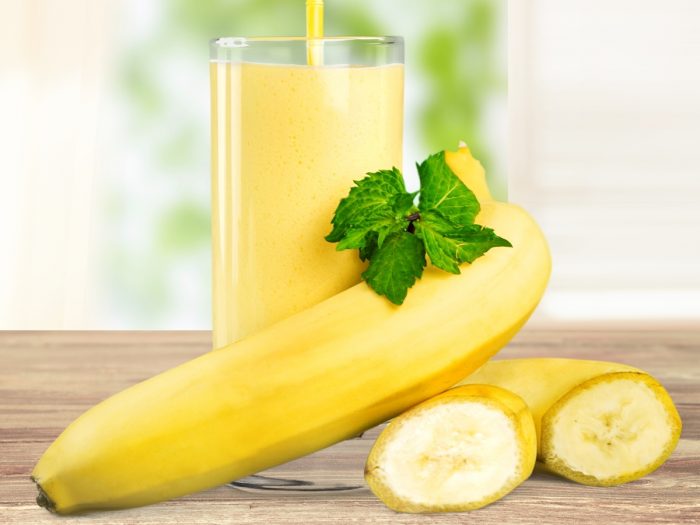Many people know that bananas are healthy but the details of banana nutrition, apart from a high level of potassium, are also important to understand.
What Does Banana Nutrition Include?
Serving Size : Nutrient Value Water [g] 74.91 Energy 89 Energy [kJ] 371 Protein [g] 1.09 Total lipid (fat) [g] 0.33 Ash [g] 0.82 Carbohydrate, by difference [g] 22.84 Fiber, total dietary [g] 2.6 Sugars, total including NLEA [g] 12.23 Sucrose [g] 2.39 Glucose (dextrose) [g] 4.98 Fructose [g] 4.85 Maltose [g] 0.01 Starch [g] 5.38 Calcium, Ca [mg] 5 Iron, Fe [mg] 0.26 Magnesium, Mg [mg] 27 Phosphorus, P [mg] 22 Potassium, K [mg] 358 Sodium, Na [mg] 1 Zinc, Zn [mg] 0.15 Copper, Cu [mg] 0.08 Manganese, Mn [mg] 0.27 Selenium, Se [µg] 1 Fluoride, F [µg] 2.2 Vitamin C, total ascorbic acid [mg] 8.7 Thiamin [mg] 0.03 Riboflavin [mg] 0.07 Niacin [mg] 0.67 Pantothenic acid [mg] 0.33 Vitamin B-6 [mg] 0.37 Folate, total [µg] 20 Folate, food [µg] 20 Folate, DFE [µg] 20 Choline, total [mg] 9.8 Betaine [mg] 0.1 Vitamin A, RAE [µg] 3 Carotene, beta [µg] 26 Carotene, alpha [µg] 25 Vitamin A, IU [IU] 64 Lutein + zeaxanthin [µg] 22 Vitamin E (alpha-tocopherol) [mg] 0.1 Tocopherol, gamma [mg] 0.02 Tocopherol, delta [mg] 0.01 Tocotrienol, alpha [mg] 0.06 Vitamin K (phylloquinone) [µg] 0.5 Fatty acids, total saturated [g] 0.11 10:0 [g] 0 12:0 [g] 0 14:0 [g] 0 16:0 [g] 0.1 18:0 [g] 0.01 Fatty acids, total monounsaturated [g] 0.03 16:1 [g] 0.01 18:1 [g] 0.02 Fatty acids, total polyunsaturated [g] 0.07 18:2 [g] 0.05 18:3 [g] 0.03 Phytosterols [mg] 16 Tryptophan [g] 0.01 Threonine [g] 0.03 Isoleucine [g] 0.03 Leucine [g] 0.07 Lysine [g] 0.05 Methionine [g] 0.01 Cystine [g] 0.01 Phenylalanine [g] 0.05 Tyrosine [g] 0.01 Valine [g] 0.05 Arginine [g] 0.05 Histidine [g] 0.08 Alanine [g] 0.04 Aspartic acid [g] 0.12 Glutamic acid [g] 0.15 Glycine [g] 0.04 Proline [g] 0.03 Serine [g] 0.04 Sources include : USDA [1]
A banana contains a diverse range of nutrients, including dietary fiber, vitamin C, potassium, vitamin B6, key amino acids, iron, manganese, magnesium, folate, vitamin A, protein and a number of antioxidants, all of which make bananas one of the most nutrient dense and delicious foods you could add to your diet. [2]
Vitamin C – In a medium-sized banana, you will take in nearly 20% of your daily requirements of vitamin C, helping to keep the immune system strong.
Vitamin A – There is a minimal amount of vitamin A in bananas – about 2% of your daily requirement.
Vitamin B6 – You only need about 1.5 milligrams of vitamin B6 each day, and a single banana provides roughly 20% of that total.

Banana smoothie or banana juice Photo Credit: Shutterstock
Amino Acids – The only amino acid found in bananas is tyrosine, and while there isn’t a huge amount in bananas, it can help improve cognitive function and boost mood.
Dietary Fiber – There are roughly 3 grams of dietary fiber in a medium-sized banana, which is more than 10% of your daily recommended amount of fiber, helping to optimize your digestive system.
Protein – There is only 1 gram of protein in bananas, but every little bit helps in the production of energy in the body!
Iron – Only 2% of your daily iron intake is provided in a banana, but this is helped along by the high vitamin C content, which makes iron more bioavailable.

Potassium – Famed for its potassium content, a medium-sized banana actually only has between 10-15% of your daily needs for this mineral; however, it is still one of the best sources and can help keep blood pressure under control. [3]
Manganese – With roughly 0.3 milligrams of manganese per banana, this takes care of roughly 15% of your daily needs for this mineral.
Magnesium – Providing 35 milligrams of magnesium in each banana, just under 10% of your daily requirement is squared away with this popular fruit.
Folate – Experts recommend roughly 400 micrograms of folate every day, and a banana provides about 25 micrograms, roughly 6% of your daily needs.
Antioxidants – The antioxidants found in bananas include lutein, beta-carotene, and selenium, as well as the antioxidant vitamins, such as vitamin A and vitamin C. Thus, banana nutrition helps lower oxidative stress and prevent chronic diseases more effectively. [4]
